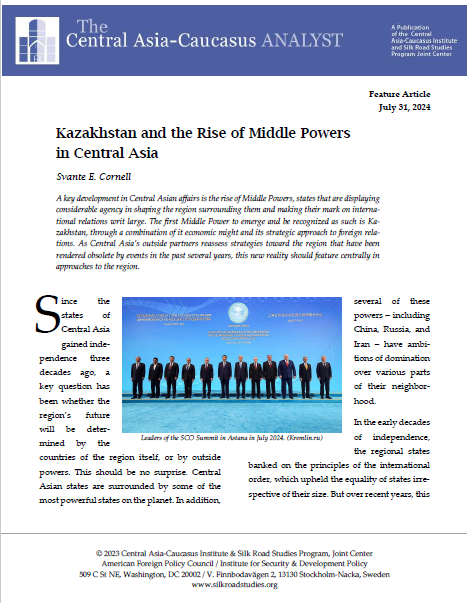Kazakhstan and the Rise of Middle Powers in Central Asia
Svante E. Cornell
July 31, 2024
A key development in Greater Central Asian affairs is the rise of Middle Powers, states that are displaying considerable agency in shaping the region surrounding them and making their mark on international relations writ large. The first Middle Power to emerge and be recognized as such is Kazakhstan, through a combination of it economic might and its strategic approach to foreign relations. As Central Asia’s outside partners reassess strategies toward the region that have been rendered obsolete by events in the past several years, this new reality should feature centrally in approaches to the region.
Russia-Kazakhstan dynamic in the context of European energy and economic security
By Mamuka Tsereteli
August 11, 2022
Kazakhstan, and Central Asia in general, needs a long-term energy and commodity export strategy. Economic and energy security for the landlocked countries requires diversification of the transportation options for export and import. Europe will need every extra barrel of oil it can get, and Kazakhstan needs reliable markets, so uninterrupted access to resources and markets through trusted connectivity with the likeminded countries should always be the priority in all times, good and bad.

Kazakhstan’s Stress Test: The January Tragedy and its Aftermath
By Ariel Cohen
January 24, 2022, the CACI Analyst
In the first weeks of 2022, Kazakhstan experienced its most intense protests since the collapse of the Soviet Union. The causes of the turmoil in the country – like any major upheaval – are multi-faceted and were long in the making. Despite the violence, the speed of crisis resolution is impressive, and the country appears to continue on its path of modernization, reforms, and a balanced foreign policy, which keeps the great powers: U.S., Russia, and China engaged and at a safe distance. Less than three weeks after the violent eruption, the painful “lessons learned” period has begun.

Kazakhstan Elects New President
By Natalia Konarzewska
June 18, 2019, the CACI Analyst
On June 9, 2019, Kazakhstan held snap presidential elections following the resignation of long-term President Nursultan Nazarbayev. Nazarbayev’s close associate and former speaker of the Senate Kassym-Jomart Tokayev won the ballot receiving 70.76 percent of the votes. The election was accompanied by large protests in the country’s capital Nur-Sultan and in Almaty, followed by detentions of hundreds of protesters. It is unlikely that the change of president will bring radical change in Kazakhstan. Tokayev has already declared his commitment to preserving Nazarbayev’s legacy. Multiple developments indicate that preparations for the power shift in Kazakhstan have been ongoing for years, suggesting that the presidential succession was carefully planned and micromanaged from behind the scenes to ensure a smooth transition of power.






 Silk Road Paper S. Frederick Starr,
Silk Road Paper S. Frederick Starr,  Book Svante E. Cornell, ed., "
Book Svante E. Cornell, ed., "